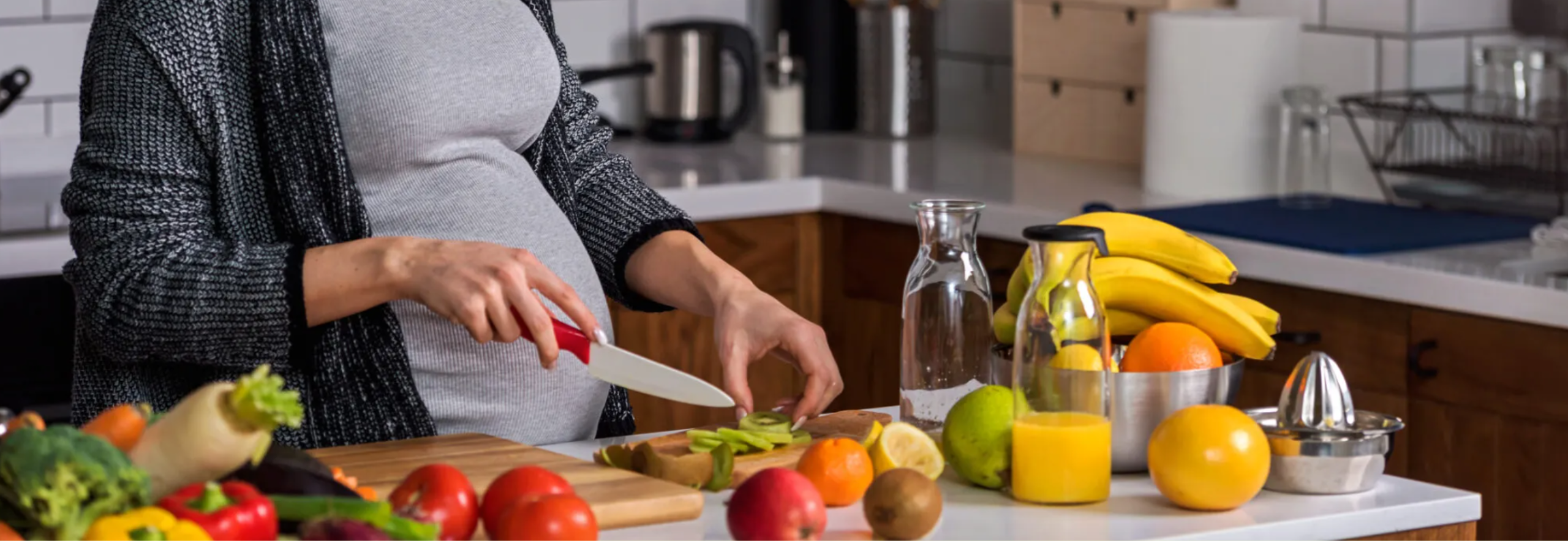Blog
Nutrition during pregnancy and breastfeeding

Author: Kädi-Liis Sepp
(the article was published in the magazine “Tere Beebi” in November 2020)
During pregnancy and breastfeeding, everything a mother consumes directly affects the child. What a mother eats, so does her child. In addition, the daily diet directly affects the mother’s well-being, on which her state of health, physical and mental well-being depends. At the same time, the food eaten by the mother is important for building all the tissues and cells of the baby. And no less important than all of this is the fact that during this period we develop eating habits for our child and the whole family for life.
During pregnancy and breastfeeding, everything a mother consumes directly affects the child. What a mother eats, so does her child. In addition, the daily diet directly affects the mother’s well-being, on which her state of health, physical and mental well-being depends. At the same time, the food eaten by the mother is important for building all the tissues and cells of the baby. And no less important than all of this is the fact that during this period we develop eating habits for our child and the whole family for life.
In reality, nutrition during pregnancy and breastfeeding is nothing more than a completely normal healthy diet. However, the need for energy from food increases during this time, and so does the need for vitamins and minerals. While a woman’s average energy requirement is about 2,000 kcal per day, it increases by 340 kcal in the second trimester and by 425 kcal in the third trimester, when the baby grows the fastest. However, during lactation, food energy consumption should be increased by 500-600 kcal.
Most of the energy from food, 50-65%, should come from carbohydrates.
But what are these good sources of carbohydrates? All whole grain products and foods. These include: whole wheat bread, rye bread, whole grain porridges, whole grain pasta. Whole grain rice, brown in color. By the way, Veski Mati from Finland has a very tasty whole grain rice assortment. Whole grain products contain B vitamins that support the development of the brain and nervous system! Because the whole grain is unbroken, all the benefits found in the grain have been preserved. There are many fibers that promote digestion, minerals such as zinc, which is the number one mineral that keeps the immune system strong, calcium and magnesium, from which bones are built.
Vegetables, fruit and berries also belong to the group of carbohydrates. Eating them during pregnancy and breastfeeding should be mandatory, as both the mother and the child get all the vitamins and minerals necessary for life.
In addition, the fetus needs protein to build cells and connective tissue. Protein should make up 15-20% of your daily dietary energy during pregnancy. Protein requirements for women increase up to 25 g per day, especially in the second and third trimester of pregnancy and while breastfeeding, because then the baby grows the fastest. While the usual recommended protein intake is 0.8 g of protein per kg of body weight, it could be 1-1.3 g per kg of body weight during the second and third trimester of pregnancy and during breastfeeding.
Good sources of protein are eggs, red meat, legumes, nuts, and dairy products. In the case of dairy products, it is worth preferring pure and fermented products such as yoghurt. Yogurts contain beneficial bacteria that improve the intestinal microflora. But be careful with yogurt and curds, as many of the products sold in stores are very high in sugar. I would rather recommend plain yoghurt, to which you can, for example, add berries, homemade jam, a spoon of honey or coconut sugar, according to your taste preference. And why not seeds and oatmeal, so you can prepare a full meal!
The third vital food group: fats.
Don’t leave fats out of your diet. I believe that those times are over, when it was thought that if you did not consume any fat, you would quickly achieve an ideal weight and good health.
Fats should cover 25-30% of daily food energy. You shouldn’t exaggerate with saturated fats, which are found mainly in animal source foods. The daily amount of saturated fatty acids should ideally be no more than 1/3 of the daily food energy from fats, such as 2 teaspoons of butter, 2 slices of bacon, 2 tablespoons of sour cream, etc. IYou can follow this recommendation by reducing the consumption of animal fats in your menu and replacing them with seeds and nuts, avocados, olives and high-quality cold-press oils.
The rest of the fats should be unsaturated fats. Which in turn are divided into monounsaturated and polyunsaturated fatty acids. Monounsaturated fats can be obtained, for example, from olive oil, avocados, almonds and peanuts. Polyunsaturated fats are omega-6 and omega-3 fatty acids, the ratio of which should be 1: 2. These are essential fatty acids, which means that the body itself does not produce them and they must be obtained through food. Examples of good sources of omega-3 are fatty fish and flaxseed. Studies have shown that children whose mothers consumed essential fatty acids during pregnancy have higher IQ scores.
During both pregnancy and breastfeeding, a woman’s need for vitamins and minerals increases, which is why the menu must be varied.
We get the best vitamins and minerals from clean unprocessed food. The food table should be rich in fruits, vegetables and berries, which supply the mother and fetus with all the nutrients, minerals and vitamins necessary for life. In addition, they promote metabolism.
Which vitamins should we pay the most attention to during pregnancy?
- Folic acid is essential for the development of the brain and nervous system. Helps prevent miscarriage and premature birth. Good sources are: green salads, broccoli, cabbage, legumes and liver.
- Vitamin B6 is necessary for the development of the fetal brain and nervous system. Good sources are: fish, poultry, bananas, prunes, whole grains.
- Vitamin D is required for the absorption of calcium and vitamin C. Vitamin D affects the development of fetal bones and teeth. The body attaches vitamin D from the sun and, to a lesser extent, from some food, like fatty fish.
- Vitamin C supports the immune system. Good sources are all berries, fruit and vegetables. Especially blackcurrants, wild strawberries, sea buckthorn, as well as tomatoes and all green salads and vegetables.
- Vitamin A deficiency in early pregnancy can lead to fetal malformations. Good sources: tomato, orange, carrot and dairy products.
Iron is the most prominent of the minerals. It has been found that 12% of women are more likely to have anemia during pregnancy. Iron helps the mother and fetus transport oxygen to the tissues. The greatest iron deficiency may occur in late pregnancy, with the greatest transfer of iron to the fetus occurring at 30. week of pregnancy.
Good sources of iron are: beets, eggs, red meat, lentils, spinach, beans, parsley, wild strawberries, tomatoes, zucchini. Vitamin C helps absorb iron. If you decide to take iron supplement, the dose should not exceed 30 mg per day, because if you don’t have iron deficiency there might be a risk of poisoning. In the case of iron preparations, you should keep in mind that coffee, tea, bran, and milk inhibit the absorption of iron.
In addition, calcium, the main function of which, together with phosphorus, is the formation of bone tissue, needs to be emphasized from minerals. Calcium is also important in terms of blood clotting and heart function. Good sources of calcium are raisins, fish, spinach, beans, soybeans, figs, plums, dates, rice. Magnesium also plays an important role in calcium metabolism. Magnesium, needed to produce energy in the cell, regulates the work of the heart muscle. Good sources of magnesium are nuts, whole grains and leafy vegetables. Excess high-fiber foods can inhibit calcium absorption.
If you decide to use supplements as an additional source of vitamins and minerals, you should definitely choose preparations made specifically for pregnant women and consult a doctor, pharmacist or nutritionist before taking them.
Nausea and vomiting occur in many women. The exact cause is unknown, but it is thought to be caused by decreased stomach muscle tone and slower gastric emptying. Choose foods that you tolerate well. Most women tolerate hard-boiled eggs, yogurt and crispbread. Nausea can be relieved with ginger, both capsules and tea. Relief has also been found from multi-vitamins, which contain zinc and B vitamins. However, you should still consult a specialist beforehand.
A balanced diet should include three main meals and a couple of snacks in between. Maybe in the second half of the pregnancy, if you feel like you can’t fit much in your stomach, meals could be tighter and portions smaller. In this way, we regularly supply ourselves with nutrients, keep the digestion healthy and mood good!
